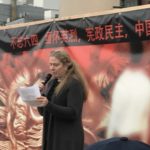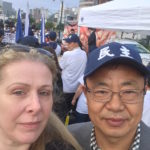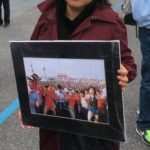BBG Watch Commentary
Amid upheaval and controversy caused by the Voice of America (VOA) senior management’s treatment of Mandarin Service programs and journalists, the independent NGO Committee for U.S. International Broadcasting (CUSIB – cusib.org) continues to focus on human rights and media freedom abuses in China. Banners calling for peace, freedom and democracy waved alongside the road next to the Hudson River as the sun set in New York City Sunday night, where hundreds of Chinese New Yorkers gathered to commemorate the 29th Anniversary of the Tiananmen Square Massacre. As in years past, CUSIB Executive Director Ann Noonan was invited to speak. She is a regular participant as a member of the public in Broadcasting Board of Governors (BBG) open board meetings and raises issues of concern to the human rights community with regard to U.S. international media outreach. She mentioned briefly her CUSIB role in her speech in New York.
###
June 3, 2018
For Immediate Release
We Must Protect the Memory of the 1989 Tiananmen Square Massacre
Banners calling for peace, freedom and democracy in China waved alongside the road next to the Hudson River as the sun set in New York City Sunday night, where hundreds of Chinese New Yorkers gathered to commemorate the 29th Anniversary of the Tiananmen Square Massacre.
Pro-Democracy leaders stood across the street from the Chinese Embassy at East 42nd Street calling for justice for the Tiananmen Mothers, the release of political dissidents including Liu Xia, the wife of the deceased Nobel Prize Laureate Liu Xiaobo, and for freedom in their homeland.
The crowd listened to speeches given by Tiananmen Survivors, poetry, and songs performed by a chorus of young people.
As in years past, Committee for U.S. International Broadcasting (CUSIB – cusib.org) Executive Director Ann Noonan was invited to speak.
Here is a transcript of her remarks as prepared for delivery:
We Must Protect the Memory of the 1989 Tiananmen Square Massacre
Thank you for welcoming me to speak at this 29th Anniversary of the Tiananmen Square Massacre. The organization I am representing this evening is the Committee to Protect US International Broadcasting. I serve as Executive Director.
It’s hard to believe that it’s been 29 years since we watched our televisions as the Chinese military tanks rolled in on thousands and thousands of students who loved their country. These students had been demonstrating for 7 weeks in Beijing, advocating for democracy and basic human rights.
We watched the Tiananmen Square Massacre unfold. It was brutal.
I pray for the souls who perished, and I pray for the survivors.
This past December, Britain’s government released a report stating that the Chinese army crackdown on the Tiananmen Square Protest killed at least 10,000 people. This number is far above previous estimates that ranged from a few hundred to more than a thousand.
We refuse to join Beijing’s campaign to enforce an international and generational amnesia and deny this part of China’s history.
We continue to stand by the protesters who have survived, and their families – especially the Tiananmen mothers. We support their call for justice.
You may have heard that a Lynching Memorial opened this past April right here in the United States of America, in Montgomery Alabama.
This Lynching Memorial is dedicated to the legacy of enslaved black people, people terrorized by lynching, African Americans humiliated by racial segregation and Jim Crow, and people of color burdened with contemporary presumptions of guilt and police violence.
I don’t think anyone will disagree that it is essential for the Lynching Museum to remain open here in the United States, to remind Americans and any visitors from anywhere in the world that America must confront its past legacy of slavery and oppression of Black Americans.
In 2008, Harry Wu opened the first Laogai Museum in the world to preserve the memory of the Laogai’s victims as well as to raise awareness that there are numerous ongoing abuses committed by the Chinese Communist regime against its own people.
Harry Wu was one of the Board Members of the Committee for US International Broadcasting. He died 2 years ago.
Harry Wu was tireless freedom fighter and a strong supporter of a peaceful and prosperous China. He always spoke up for the victims of the Tiananmen Square Massacre.
I believe the Laogai Museum has been the only museum that holds a permanent exhibit about the Tiananmen Square Massacre.
The Laogai Museum has been closed for the past year and a half.
When people ask me when the Laogai Museum will re-open, I have no answer. What can I say? I don’t know, but I imagine the current Board Members do know.
They should explain what is happening to the exhibits and the documents that are an important part of world history: documents that Harry Wu collected and preserved about the Tiananmen Square Massacre, about forced abortion and forced sterilization, about organ harvesting, about religious persecution, and China’s vast Laogai system – that seems to be expanding today as China’s government imprisons hundreds of thousands of Uyghur Muslims. These documents and exhibits all need to be protected and preserved, and made available to the public and the world.
America and China must never forget the legacy of the Tiananmen Square Massacre, nor should we let the legacy of the Laogai Museum fade into oblivion.
Thank you very much.




